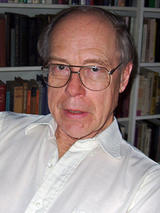Alexander Welsh
Emily Sanford Professor of English Literature
 Sandy Welsh, A.B., Ph.D. Harvard University, assistant and associate professor at Yale from 1960-1967, professor at Yale (after professorships at Pittsburgh and UCLA) since 1991, you have been one of the most continuously productive and innovative figures in your generation in the field of English prose. You have written major influential and indispensable books on the great 19th century British novelists, books that have reshaped the field of Victorian fiction as well as done much to define the new field of law and literature. Your book on Scott’s Waverly Novels is by common agreement the best of its kind. Your much admired George Eliot and Blackmail interprets Eliot’s work against the background of Victorian social history. Your three formidable books on Charles Dickens make you the pre-eminent living critic of his towering novels.
Sandy Welsh, A.B., Ph.D. Harvard University, assistant and associate professor at Yale from 1960-1967, professor at Yale (after professorships at Pittsburgh and UCLA) since 1991, you have been one of the most continuously productive and innovative figures in your generation in the field of English prose. You have written major influential and indispensable books on the great 19th century British novelists, books that have reshaped the field of Victorian fiction as well as done much to define the new field of law and literature. Your book on Scott’s Waverly Novels is by common agreement the best of its kind. Your much admired George Eliot and Blackmail interprets Eliot’s work against the background of Victorian social history. Your three formidable books on Charles Dickens make you the pre-eminent living critic of his towering novels.
This work alone would place you in the pantheon of distinguished critics of your day. But there is more. You have ventured far outside the canon of 19th century British literature, in distinguished books on Don Quixote and the idea of the hero, on Freud’s Interpretation of Dreams, and on the afterlife of Hamlet in European literature. All of these have been lauded for their originality, substance and style, and live up to Aristotle’s difficult ideal—to address a subject with the degree of complexity that the subject properly admits of. Taken as a whole, your scholarly contribution is of the first rank.
Beyond this, you are valued by colleagues and students alike for your blend of uncommon resourcefulness and common sense. You are one of those who, at the highest levels of the faculty, embody the ideal of democratic service in all kinds of teaching and administration, most recently doing the work of DUS when your services were badly needed. You are valued further for your honesty and integrity and for teaching by example: in meeting after meeting of the department’s faculty you have shown what it means to form and deliver judgments with firmness, yet with a humanity and modulation that prods and encourages others to think. When you were in junior high school, you picked “college professor” on a vocational test, and in a strange act of premonition or destiny, pasted on the cover of your class submission on your future vocation a photograph of Harkness Tower. Today with Harkness Tower looming just beyond the Old Campus outside this room, and with your destiny fulfilled, your colleagues thanks and praise you for your tremendous contributions to scholarship and to Yale.
Tribute Editor: Penelope Laurans